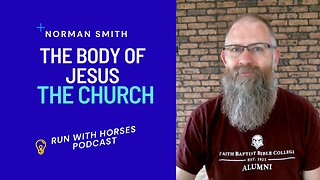Jesus Is Still Transforming Lives Today | Riot Podcast Ep 156 | Christian Podcast
𝗖𝗵𝗿𝗶𝘀𝘁𝗶𝗮𝗻 𝗗𝗶𝘀𝗰𝗶𝗽𝗹𝗲𝘀𝗵𝗶𝗽 𝗣𝗼𝗱𝗰𝗮𝘀𝘁 𝐋𝐈𝐒𝐓𝐄𝐍 𝐍𝐎𝐖❗
𝗥𝗜𝗢𝗧 𝗣𝗼𝗱𝗰𝗮𝘀𝘁 𝗘𝗽. 𝗥𝗜𝗢𝗧 𝗣𝗼𝗱𝗰𝗮𝘀𝘁 𝗘𝗽. 𝟏𝟓𝟔 " 𝐉𝐞𝐬𝐮𝐬 𝐒𝐭𝐢𝐥𝐥 𝐓𝐫𝐚𝐧𝐬𝐟𝐨𝐫𝐦𝐢𝐧𝐠 𝐋𝐢𝐯𝐞𝐬 𝐓𝐨𝐝𝐚𝐲"
In the final chapter of the book of John, chapter 21, there are several key reasons why John chose to continue the narrative beyond the dramatic events of chapter 20. First, he wanted to emphasize the restoration of Peter to his discipleship, as this was an important aspect of the disciples' journey with Jesus. This restoration is significant, considering Peter's earlier denial of Jesus.
Another reason for John's extension of the narrative was to address a rumor that had spread among believers, suggesting that John would live until the return of Jesus. John clarified that this was a misunderstanding of the Lord's words.
Additionally, John aimed to teach his readers how to relate to the risen Christ, as this was a crucial time for the disciples, who were about to take on the responsibility of spreading God's message to others.
The scene by the Sea of Galilee where Peter goes fishing without a clear explanation can be interpreted in different ways. Some believe Peter did so to support himself financially, while others think it was a departure from the life he had been called to. The significance of this action may lie in Peter's uncertainty and perhaps a return to the familiar after Jesus' resurrection.
It's noteworthy that even after Jesus' resurrection, the disciples did not always recognize Him when He appeared to them. His question about their catch of fish not being enough to eat likely served to confirm His identity and highlight their need for His provision.
The phrase "fishers of men" was not coined by Jesus but was a well-known concept in that era, symbolizing the idea of persuading and catching people with the truth. Just as fish die when caught by a fisherman, this phrase emphasizes the spiritual awakening that Christians are called to bring to others.
When Jesus met the disciples on the beach, He provided them with breakfast before addressing their spiritual needs, demonstrating His care and love for them.
The three personal questions Jesus asked Peter, corresponding to his three denials, emphasized the importance of dealing with sin according to its visibility. Private sins should be confessed privately, while public sins should be acknowledged publicly.
The use of different Greek words for "love" in the conversation between Jesus and Peter (agape and phileo) may highlight the distinction between divine, selfless love and affectionate friendship love. In the end, both Jesus and Peter used "phileo," suggesting a deeper connection of friendship and fondness.
Peter's role as both an evangelist and a pastor is evident in the change from the image of a fisherman to that of a shepherd. These roles often complement each other in ministry.
Jesus discussing Peter's future martyrdom may have been surprising, but it underscored the gravity and cost of discipleship. Peter likely rejoiced at the restoration of his relationship with Jesus, despite this revelation.
When Jesus said, "Follow me," to Peter, it was a powerful message of love, forgiveness, and the importance of persistence in following Christ, regardless of past failures.
As John concludes his book, he reaffirms the credibility of his witness, emphasizing that he wrote what he did under the guidance of the Holy Spirit. The book ends with Peter and John following Jesus into the book of Acts, symbolizing the ongoing journey of the disciples as they spread the message of Christ.
In summary, John 21 serves multiple purposes, including emphasizing Peter's restoration, addressing rumors, teaching readers how to relate to the risen Christ, and highlighting the importance of love and persistence in following Jesus. It's a powerful conclusion to the Gospel of John and a segue into the early Christian ministry depicted in the book of Acts.
📌 https://linktr.ee/riotpodcast
📌 https://youtu.be/B74botVwFP4
-
 59:25
59:25
RiotPodcast
1 year agoDo you desire Humility and Grace? | RIOT Podcast Ep 113 | Christian Discipleship Podcast
27 -
 1:01:17
1:01:17
RiotPodcast
1 year agoHow do life’s circumstances increase our faith? | RIOT Podcast Ep95 | Christian Discipleship Podcast
24 -
 0:59
0:59
Christian Sermons and Audio Books
7 months agoThe Righteousness of the Lord Jesus Christ - Pastor Patrick Hines Podcast #shorts #jesussaves #God
74 -
 28:00
28:00
RWHPodcast
8 months agoThe Body Of Jesus, The Church - EP.246 -Run With Horses Podcast
-
 0:59
0:59
Christian Sermons and Audio Books
7 months agoJESUS KEPT SILENT - PASTOR PATRICK HINES PODCAST Nehemiah 2:11-20 #shorts #jesuschrist #shortsvideo
126 -
 56:01
56:01
RWHPodcast
1 month agoWhat do you know about Worship? - Ep. 309 - Run With Horses Podcast
28 -
 1:33:43
1:33:43
HandinHandwithGodTv
1 year ago20 Questions with Pastor Mike (Episode 87)
69 -
 1:05:12
1:05:12
We Must Take A Stand Today For Christ If you wont stand for something you will fall for anything
11 months agoWow! Is the Bible enough. Evangelist Schwanke just keeps getting better. "Is The Bible Enough?" Tuesday
155 -
 13:34
13:34
Christian Sermons and Audio Books
7 months agoGod as the Holy Trinity - Pastor Patrick Hines Podcast
66 -
 0:57
0:57
Christian Sermons and Audio Books
7 months agoWHY DOES GOD SAVE UNDESERVING SINNERS LIKE US? - PASTOR PATRICK HINES PODCAST #shorts #jesuschrist
51